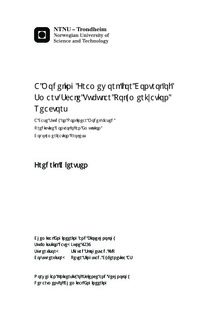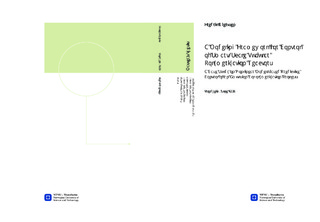| dc.description.abstract | Polymer science is the underlying topic of this master's thesis, and the main scope is to develop and deploy models for on-line optimization and control for polymerization reactors. Specifically, free-radical emulsion copolymerization processes are studied, and the connection between lab-scale experiments to validate the models and the possible usage of the models for industrial-scale applications is maintained. In the work preceding this thesis, the author studied a semi-batch reactor setup for a specific free-radical emulsion copolymerization system, and the purpose of this thesis is to extend the previously established ideas to apply for continuous tubular reactors for a similar chemical system as well.
In going from batch type reactor setups, which are typically well-mixed tank reactors, to continuous type reactors with spatial distribution, the model equations are typically changed from ordinary differential equations to partial differential equations. A portion of the thesis is dedicated to establishing the model equations for a distributed system in general, and presenting various approaches to solve a system of partial differential equations. The thesis considers two approaches for this, where one is a spatial discretization method using finite differences to achieve a system of ordinary differential equations, while the other approach is based on a transformation of the variables in the coordinate system of the spatial problem. The respective residence time distributions for the developed models have been used to evaluate the mixing effects of the reactor models, in comparison with lab-scale experiments. Throughout the modeling work, the trade-off between accuracy and numerical efficiency for the models is central.
The mathematical models from the work are mainly formulated in the programming/modeling language Modelica. By using some of the in-house developed software of Cybernetica AS, several test cases are simulated to demonstrate how the models perform in on-line use. In order to mimic the behavior of a real plant, so-called plant replacement models are deployed. This is done to create a (slight) discrepancy between the "real" behavior of the reactor and the model on which the controller bases its calculations. In such cases, the need for an on-line estimator becomes evident, and for this thesis a Kalman filter type estimator is deployed. A theoretical foundation is established for both on-line estimation and control using model-based predictive control. The properties that are given the most attention in the context of control are the reactor outlet temperature and the conversion of monomer species through the reactor.
The results indicate that in order to encapture the mixing effects of a tubular reactor, as governed by the experiments, the models will require very refined discretization schemes in space, which are hard to obtain without compromising the numerical efficiency of the models. Despite of these observations, the tests show that models with a coarse spatial discretization tend to perform surprisingly well for the purpose of controlling the reactor temperature and the conversion of monomer. When plant replacement models are being deployed, the importance of an active and well-functioning estimator is demonstrated. Both the estimator and the controller are tuned in the simulations to yield as effective performance as possible for setpoint changes etc. In addition, test simulations are conducted in which the cooling jacket of the reactor is segmented to yield two separate degrees of freedom with respect to the cooling of the reactor. This provides a way to control the temperature dependent kinetics of the reactor indirectly, in addition to the actual reactor temperature. | |

